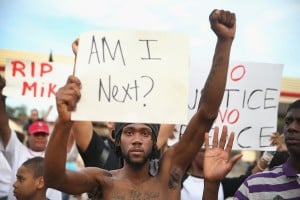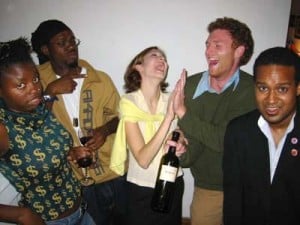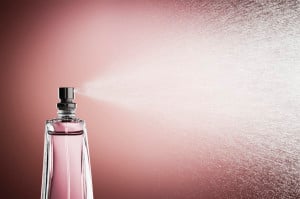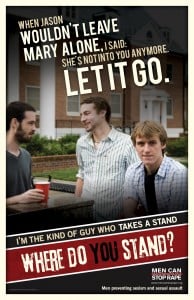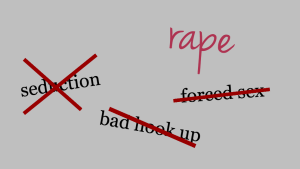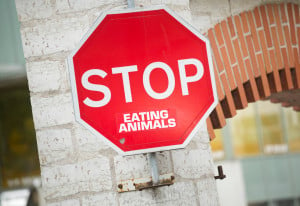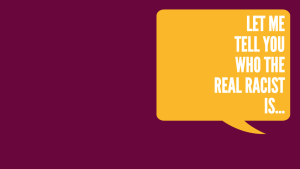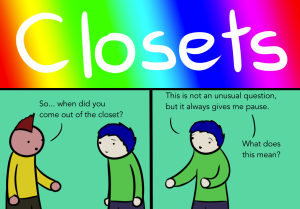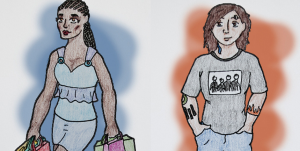
Two people talking while walking.
White people say the darndest things.
And these days, many Black, Indigenous and People of Color (BIPOC), along with many White people, are in agreement that there are certain statements or ways of thinking that are classic evidence of a White person.
You know, the kind of White person you wouldn’t want sitting on the jury to convict racist, murdering cops or coming to your cookout anytime soon.
But what about when light-skinned and white-passing BIPOC say similar things?
Are we — and by we I mean light-skinned and white-passing people of color — willing to examine our ways of thinking and existing in a world that casts all things black or dark as bad and all things white or light as good?
Are we willing to see how we play into racism, especially anti-blackness, by remaining unaware of the ways that we may benefit from it?
Are we willing to think about ways we can personally fight against colorism in our personal relationships and do work to shift these harmful ways of thinking and acting in society as a whole?
Even if you have never said any of these things, or not said them in quite the same way, I guarantee you have heard someone else say similar things.
The fact that people tend to repeat the same lines of thought over and over through words and actions is evidence that we are influenced by ideologies and politics.
Take, for example, the song “Don’t Touch My Hair” by Solange. The song has resonated for so many because it expresses an experience for Black people that is widespread, significant, and totally related to the ways that Blackness — and associated traits such as natural hair — are both exoticized and denigrated in society.
In the same way, each of the points below are rooted in personal and collective experiences — of my own as well as of my loved ones and communities.
These statements reflect behaviors and ways of thinking that bring emotional, mental, and economic harm and even death to BIPOC, especially Black and Latinx people who are darker-skinned.
1. “You’re just jealous because I’m pretty and you’re not.”
We gotta start with this one because some version of this statement is said countless times each day, in real life and in the comments section of Instagram and Twitter accounts.
They often happen when darker-skinned people question the ways that lighter-skinned people with skin tones and facial features that more closely resemble the white ideal of beauty are considered more attractive than those with darker skin.
There are even hashtags like #TeamLightSkin that highlight the superiority of light-skinned beauty.
Such phrases also illustrate some of the ways being light-skinned or white-passing varies depending on gender.
More specifically, the pressures on women and other feminine-appearing people to conform to beauty standards is particularly intense, as exemplified by the global multi-billion dollar skin-lightening industry.
Of course, men also face pressures to conform to white beauty standards, as shown most recently by the widespread discussion around baseball legend Sammy Sosa’s bleached skin tone transformation.
How do we know what makes someone beautiful or not? If we examine the way US society decides who is beautiful, it becomes pretty clear that white and light is right. And, by supporting these beauty standards with these types of comments, we ultimately hurt ourselves and everyone around us.
2. “It’s not my fault that I was born into this body. What can I do about it?”
There are certain things I can take for granted that I didn’t always understand came from the privileges I experience as a light-skinned, masculine-appearing person of mixed Latino/Chicano and Asian/Filipino heritage.
For example, I didn’t always realize that White people checking out the neighborhood I lived in were approaching me and not darker-skinned Black and Latino neighbors to ask me if the block was “safe” because they considered my lighter skin tone and Asian features to be less threatening.
These dynamics are what many call light-skinned or white-passing privilege, which exists because of a phenomenon that writer Alice Walker first called colorism in 1982.
Even when we can acknowledge that colorism exists, us light-skinned and white-passing people of color have a hard time getting past the paralysis of guilt and shame over having benefits that we did not choose to receive.
However, the failure of imagination that occurs when we let guilt and shame rule us prevents us from seeing the opportunities that come with occupying a place that is neither here nor there.
Those of us who do not face many of the more brutal or daily-but-draining aspects of racism that our darker-skinned siblings face can potentially use the extra capacity or energy we have — along with the ways that White people might be more open to listening to us and lending us credibility — to push back at racism.
Additionally, light-skinned and white-passing people can use our tendency for increased access to wealth to enrich our communities as a whole and not just ourselves and our families.
Of course, everyone has different capacities and experiences that may or may not make us able to do this work. But, in the end, we have the privilege to make the decision about what we are willing to give up in the struggle to create a more just world.
3. “You’re ignoring the fact that I’m really pale right now because it’s winter!”
The very definition of light-skinned or white-passing privilege is the prerogative to tan our skin and be encouraged to do so by the world at large.
On the flipside, many of us may have experienced being discouraged to go out in the sun, lest our skin get darker. Both attitudes stem from white supremacist beauty standards.
All-in-all, white supremacy can be so twisted that it has us doing acrobatics in order to both feel attractive and accepted by our communities.
Those with conditional white-passing privilege — which is when a BIPOC might be recognized as either White or BIPOC depending on context — may regard tanning as a way to feel closer to their community.
When a light-skinned BIPOC’s skin is darker, they may be more recognizable to the communities they so desperately want to be accepted by.
On the other hand, we may have been told time and again that what makes us attractive, and therefore worthy, is our light skin tone. There are some very confusing contradictions but I have faith we can navigate them.
The more we learn to reject white supremacist beauty standards, the more potential we will have for more easeful and equitable relationships with our darker-skinned friends and family and the more potential we will have to be happy with the bodies we are in.
4. “Not *all* light-skinned and white-passing people…”
Humans commit murder, rape, and genocide. When you see this statement, do you rush to the defense of humans and point out all of the humans who have not done these things?
Probably not, right? So why do we get so defensive when people point out general trends that apply to more specific groups of humans?
People who feel defensive about being identified with a group that has shown a pattern of negative or entitled behaviors or dynamics often insist upon pointing out all the times that individuals in their group did not display that behavior.
This is a natural reaction to feeling called out or judged.
However, we light-skinned and white-passing BIPOC can exercise restraint and compassion by not saying any of these things out loud.
When we rush to the defense of light-skinned and white-passing people, not only do we squander an opportunity to show solidarity with our fellow BIPOC, we also prove the point that we are incapable of stepping back and being humble in the face of the many troubling examples of colorism.
Especially disturbing are examples of lighter-skinned people targeting and unjustly murdering darker-skinned people with impunity, such as the murder of innocent Black people by white supremacist Latinos.
Rather than getting defensive, try taking a moment to pause. Your silence makes space for others to express the full impact of their experiences and — in these moments — is what solidarity looks like.
5. “This whole discussion is divisive and keeps us from working against the real enemy!”
This statement is, potentially, the most harmful one on the list. If we are to live in a world where color truly does not matter, truly does not determine the well-being, happiness, and mortality of human beings, then there is work to do on many levels and in many ways.
In the meantime, there are many areas in which we must do work, some of which is internal to BIPOC communities, some of which is about our relationships with White people. It is okay for some of us to focus on certain aspects of that work while others do something else.
Unless we want to go from being oppressed to becoming the oppressors, we must address colorism in our communities.
Otherwise, we risk becoming like Cuba, a country that launched an economic revolution led by a light-skinned Cubano and continues to struggle with anti-black racism.
Some Notes on How to Use This List
This article will not tell you if you are a good or bad person. It will not tell you whether someone else is a good or bad person. It will only give you points for reflection if you are a light-skinned or white-passing person.
It may also provide examples of colorism that might help you to address this subject with others. People have been offering brilliant commentary on colorism before it was even a term, some of these discussions have been linked throughout this article.
This article can serve as a stepping off point to learn more and bring more into your everyday interactions.
Let me also say that, ultimately, none of this discussion is about policing or punishing people for their thoughts or actions.
My only wish is that we can all come to see the ways that issues of light-skinned and white-passing privilege and colorism cause real harm in our communities and put in work to stop these harms.
Dear White People, This Conversation Is Not For You
Please do not send this article to your friends who you consider light-skinned or white-passing as a passive-aggressive attempt to put them in their place.
You are also welcome to not chime in on this conversation because this is about internal work that BIPOC need to do amongst ourselves to work together more effectively in the fight against white supremacy.
[do_widget id=’text-101′]
Nico Dacumos is an Everyday Feminism Reporting Fellow. Nico is a lower-middle class and college-educated child of a Manila-born Ilocano, and a Central California Chicana. He currently writes, teaches high school, runs a decolonial food pop-up, builds spiritual community, loves, co-parents, and instigates non-binary transgender faggotry in Oakland, CA.
Search our 3000+ articles!
Read our articles about:
Our online racial justice training
Used by hundreds of universities, non-profits, and businesses.
Click to learn more
Most Read Articles
- « Previous
- 1
- …
- 30
- 31
- 32








